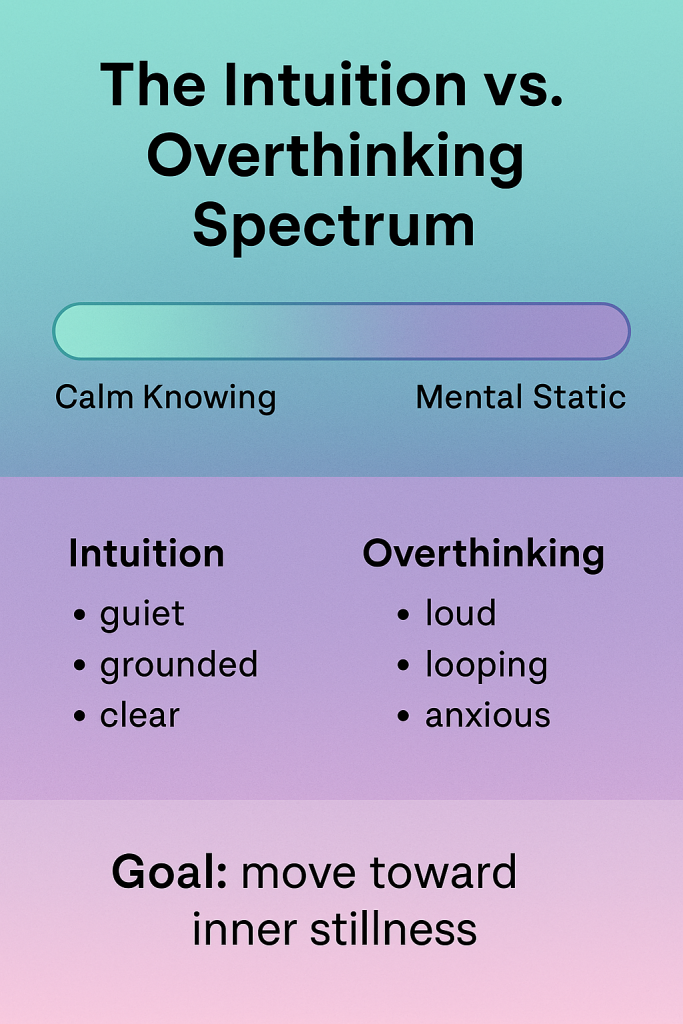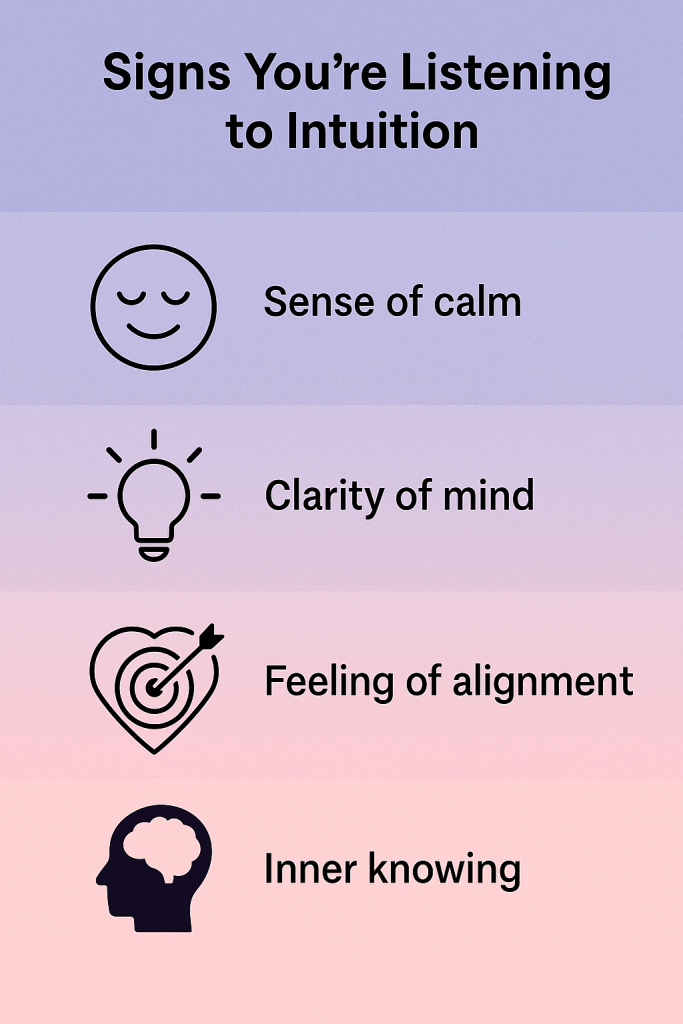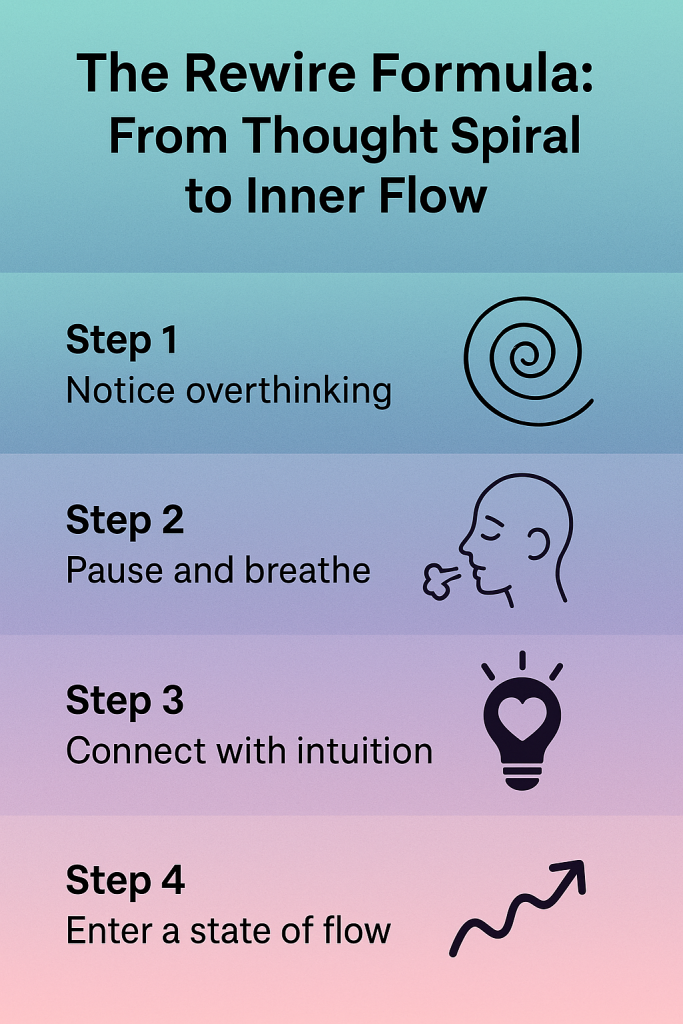Listening to Your Intuition
Have you ever had a small voice tell you to “call him,” or “don’t sign that contract?” It might be something you hear for just a second, and then your logic takes over. Then out of nowhere, you’re arguing with yourself, trying to decide which outcomes could happen, and then looking to places like Google for reassurance or asking your friends to help you make your decision.
This is the mind’s time of overthinking. When this happens, it gives us the idea that we are rational, safe, but most importantly, in control. But the truth is, this blocks our connection with the best gift that we have, intuition.
Intuition is your inner voice that will gently lead you. It’s not about mystics, but it’s about being aware of your instincts. This helps you to work through your careers, relationships, and everyday life, and it shows up when logic can’t. Intuition doesn’t scream at you, but it whispers to you. When you have too much mental chatter, though, it’s hard to hear it.
Overthinking is like static that stops you from being able to hear a clear signal. The goal isn’t to quiet your mind completely, but it’s about tuning into it so that you can use analytics and intuitive channels to help you have peace and harmony.

Understanding What Intuition Is and Isn’t
Let’s clear up a common misunderstanding: intuition isn’t guesswork, luck, or something only certain people possess. It’s a built-in human skill. Business researchers explain that intuition works by spotting patterns faster than the logical mind can keep up. Your brain gathers information constantly, and intuition is simply its quickest way of delivering a conclusion.
Think of it like an inner library that stores every moment you’ve lived, which is every feeling, memory, conversation, and instinctive observation. When a new situation shows up, your intuition compares it to what you’ve learned before and gives you a quick signal: move forward, hold back, or wait and see. That’s why intuitive nudges feel sudden because your mind already made the connection long before you could explain it.
On a spiritual level, intuition feels like guidance from a deeper part of yourself, which is the part that doesn’t need proof to know what’s right. Psychics often describe it as a soft pull toward what aligns with your truth. Whether someone calls it gut instinct, higher self, or inner guidance, the experience is the same: it points you toward what feels supportive, honest, and real.
When intuition leads, decisions feel steady. When we ignore that voice, inner conflict makes everything louder.
Overthinking Is a Problem
Overthinking originally developed as a survival tool, which is a way for the brain to scan for danger and protect us. But today, our challenges look less like wild animals and more like daily stress: unanswered messages, work pressure, uncertainty about relationships. The brain keeps sounding the alarm, anyway, pushing us into mental overdrive.
When we start spinning in “what ifs,” the body reacts just like it would to a physical threat. Muscles tighten. Stress hormones rise. The logical part of the brain takes over, leaving little room for creativity or instinct. Research shows that constant rumination strengthens fear responses and weakens the areas that help us gain insight.
Intuition needs quiet to speak clearly. Stress does the opposite, but it scatters attention and shakes the inner compass. It’s like trying to read a reflection in water that’s been stirred up.
A therapist once shared that a client spent weeks debating whether to leave a relationship. Her instinct knew the answer almost immediately. But fear made her second-guess everything. She wasn’t confused; she was afraid of acting on what she already sensed to be true.
Overthinking tries to solve uncertainty by thinking harder. Intuition guides you forward even when the path isn’t fully visible.
How to Know You’re Overthinking and Not Using Intuition
Overthinking and intuition might seem the same at first because they both feel like they come from your mind. They both work on different frequencies, and here’s how you can tell:
Overthinking
Here are some signs you’re overthinking:
- You ask the same question without new insight.
- You ask ten of your friends to validate you.
- Your body feels tense after you think about it.
- You feel stressed until you take action, but the relief doesn’t stay.
- You rationalize the choices that you’ve made.
Intuition
Here are some signs that you’re using intuition:

- Your answer is sudden and simple.
- You feel sure, calm, and happy even without evidence.
- Your body feels warm, and tension is released.
- You don’t need to debate; the answer just comes.
The body helps you to have more intuition, and if you have a thought that contradicts, this is fear. If it gives you a feeling of relief, then this is the truth.
Logic Versus Intuition
Your mind works on two different operating systems: the one that is fast and intuitive, and the one that is slow and analytical. Both are needed, but when the slow and analytical system dominates the other, it can’t give you the insights you need.
Intuition is part of the right hemisphere of the brain and works with the limbic system, which is the area that is responsible for emotion, holistic thinking, and pattern recognition. Logic is in the left hemisphere, and it governs linear reasoning and language.
When you start overthinking things, the left hemisphere gets all of the intention, and it verbalizes, categorizes, and dissects every feeling and emotion until you can no longer hear intuition. But on the other hand, the funny thing is that your intuitive brain already knows, but it just doesn’t talk in full sentences.
According to “Psychology Today,” intuition uses implicit memory, which is the stored wisdom that someone has from their lived experiences. This isn’t irrational, but it’s a pre-verbal intelligence. The secret is integrating and not eliminating. Logic helps you to navigate, and intuition tells you which direction you should go.
Controlling Fear and Getting Past Overthinking
Overthinking and fear are connected. Fear of loss of control is the biggest thing. It’s a way that you can micromanage when you are uncertain about something and you want to have a guaranteed outcome.
Control is the opposite of trusting your intuition. Intuition in itself is a surrender. It’s like you are standing at the edge of the pool and you have to jump to make sure that the water will really catch you.
A client once said that she used to dissect every text that her partner sent her. She said, “I’d zoom in on emojis like they were evidence in a crime scene. My stomach knew he was drifting, but I didn’t want to feel it. Thinking was safer than knowing.”
This shows the heart of the problem. Overthinking feels protective, but sometimes it means paralysis. You can’t get the intuition that you need or the truth when you’re guarding yourself against emotional discomfort.
To reconnect with your intuition, you have to make peace with uncertainty. The unknown isn’t your enemy but the place where your guidance comes from.
Opening Your Mind to Hear Your Intuition
You can’t force intuition with logic. But you can help your mind relax enough for intuitive guidance to be heard again.
1. Settle the body first.
Intuition works through sensation, not stress. When the nervous system is overwhelmed, inner signals get drowned out. Gentle grounding, slow breathing, or a short mindfulness moment can calm the system so that clarity has room to rise. Research continues to show that relaxation practices reduce mental noise and support better decision-making.
2. Ask softer questions.
Instead of demanding answers or pushing for control, try wording your questions with curiosity:
- What feels supportive right now?
- What’s the next small step?
Curiosity opens the door. Pressure slams it shut.
3. Write before you overthink.
Try this morning ritual: ask a question on paper, then write the very first thing that pops into your awareness. Don’t edit. Don’t judge. Over time, you’ll notice a pattern: many of those quick first impressions end up being right. Confidence builds each time you notice intuition guiding you well.
4. Practice pockets of quiet.
Start with just two minutes a day. No music. No scrolling. Just breathing. At first, your mind might jump around, but with repetition, those brief pauses become the moments when intuitive insights slip through.
5. Take tiny leaps of trust.
Let intuition guide small choices like what to wear, where to eat, and which playlist to pick. Each little act of following your inner nudge builds strength, like exercising a muscle you forgot you had.
A professional I once met tried a simple challenge: for 24 hours, she followed her first instinct for every small decision. At the end, she told me, “I felt like life stopped pushing against me.” That lightness she noticed? That was her intuition finally getting room to lead.
Getting Past Psychic Noise and Mental Clutter
Just like mental clutter can cause you to miss logic, energetic clutter can also cloud your intuition. A person who is an empath or overly sensitive will absorb subtle information such as emotions, moods, and energetic residue from other people and places. Without cleansing themselves, it can cause psychic blocks and static.
Here are some easy ways that you can reset your intuitive clarity and cleanse your energy:
- Salt Baths or Showers: This helps to get rid of emotional residue.
- Grounding Stones: Try Smokey Quartz that keeps your energy anchored and strong.
- Visualizing Light: Imagine light going through your aura and resetting your energy field.
- Digital and Physical Boundaries: Create boundaries that help to reduce psychic noise.
Skeptics can even see that this is part of psychology. They believe that these rituals are symbolic signals that go to the brain to tell the brain that you’re safe and can think clearly.
There are many intuitive readers who are found on reputable sites like PsychicOz.com. They talk about having the same kinds of habits, such as holding Selenite, pausing between readings, or visualizing lights to help cleanse their space. It’s not a superstition, but it’s about neuroscience and rituals coming together. The brain will respond to this intention.
Trusting Your Gut
Not every strong feeling comes from intuition. Sometimes, fear or excitement dresses up like inner guidance. One way to tell the difference is by noticing the tone of the message.
Intuition usually arrives quietly. It feels steady and clear, even if the message asks you to make a hard choice. Emotional reactions, on the other hand, feel loud and urgent. If the voice in your head sounds panicked or tries to rush you, that’s emotion talking. When the guidance feels calm and familiar, even when it surprises you and that’s often intuition.
A psychic once described it like this: intuition feels like remembering something from the future. It’s a simple internal “I know this,” without the noise.
That doesn’t mean logic disappears. The two are meant to work together. Intuition points toward what’s right for you. Logic helps you handle the practical steps. Your intuition might say, “This move feels right.” Your mind then figures out the budget, timeline, and details. When they partner instead of arguing, choices feel smoother and more aligned.
7-Day Intuition Reset: How to Reconnect
Here’s a gentle one-week plan to quiet the mind and rebuild trust with your inner guidance:
Day 1: Quiet Space from Screens
Set aside one hour without your phone. Notice what thoughts come through when you’re not distracting your mind.
Day 2: Feel What’s Happening Inside
Pause a few times throughout the day and ask, “What does this moment feel like in my body?” Name the sensations. This strengthens your internal listening.
Day 3: First-Response Journaling
Write down three questions about your life. Capture the very first gut response before you think it through. Revisit later and you’ll start spotting real hits.
Day 4: Connect with Nature
Take a short walk outdoors with no music or podcasts. Let the sounds, colors, and movement around you settle your attention.
Day 5: Small Decisions, Instant Answers
Let your gut choose something low-stakes: what to eat, what shirt to wear, where to go first. Pay attention to how those choices feel.
Day 6: Dream Notes
Keep a journal by your bed. Write or sketch anything you remember when you wake up — even a quick feeling or color. Dreams often speak the language of intuition.
Day 7: Reflect on Your Wins
Look back over the week. Highlight moments where trusting your instinct brought ease, clarity, or a good outcome. Those are the breadcrumbs leading you back to your inner voice.
Seeing Intuition as a Sense
In the psychic world, intuition isn’t a mystery, but it’s having a skill. Psychics, readers, mediums, and energy healers practice tuning into their internal voice just like musicians tune into instruments and voices.
They clear their energy before they do their sessions, such as meditating to make sure that their emotions are aligned, and they use psychic listening. This means not hearing words but feeling impressions, and over time, their intuition becomes exact.
One intuitive talked about that before every reading that she would close her eyes and imagine a radio with a dial. She said, “I imagine in my mind’s voice of turning the volume down. And a frequency of calm when turning it up.” Within a few seconds, her intuition becomes stronger.
This is something that can work for you, even if you’re not psychic. Intuition and logic should be like a relationship where they work together. You might need to lower the volume of one to hear the other and vice versa.
Rituals that Can Help Strengthen Your Inner Voice
Here are some rituals that can help to strengthen your inner voice:
1. Begin with quiet.
Give yourself the first few minutes of the day with no screens, no talking, just presence. Notice what you feel drawn toward before the world influences you. The answer is usually already waiting.
2. Let your body lead.
Gentle movement, like stretching, a walk, or a few yoga poses, helps release mental tension and reconnects you with your inner signals. When the body settles, intuition rises.
3. Nourish your energy.
Good hydration and steady nutrition support clear thinking and steady emotions. When the body is drained, intuitive messages become harder to interpret.
4. Make room for creativity.
Coloring, cooking freely, journaling, or making music wakes up the intuitive parts of the brain that overthinking tends to shut down. Play is medicine.
5. End the day by letting go.
Write down anything that’s weighing on your mind before you go to bed. The subconscious sorts through what you release, making room for clarity by morning.
These simple habits help your thoughts, emotions, and energy communicate more easily. Many health experts note that mindful routines boost focus, elevate mood, and lower stress, which are the exact conditions intuition needs to be heard.
Your Intuition Matters
We live in a time where information comes from every direction, and too much information can make decisions harder, not easier. Intuition is the internal guide that filters out the noise. It highlights what truly matters in your work, relationships, and personal choices.
Forward-thinking leaders and creatives see intuition as a key skill for innovation. It’s not a rejection of logic, but it’s the missing half of decision-making that logic alone can’t cover.
But intuition isn’t only about success. It’s about staying human. It helps us understand each other. It helps us follow timing and flow. It keeps us aligned with who we are.
Where overthinking creates distance, intuition builds connection. And right now, the world is hungry for more people who can feel truth and not just analyze it.
Final Thoughts: Stop Overthinking and Use Intuition
The ego uses overthinking to try and protect you, but your intuition is the way that your soul tries to guide you. One tells you to be careful, and the other one tells you to be yourself.
You don’t have to get rid of thoughts, but you just need to let loose. Start with small experiments to trust yourself, such as pausing before you reply or breathing before you decide. You can even take time to feel what is happening before analyzing the situation. Your body already knows the answer.
When you take time to quiet your mental chatter, you will see that your intuition is stronger. It’s a time that your mind will calm and exhale, let your shoulders relax, and let the clarity come. This isn’t an argument with your body but peace.
When you rewire your mind, you will see that clarity doesn’t come from thinking harder, but it comes from listening and being open-minded.

Frequently Asked Questions
Why does overthinking block intuition?
Overthinking creates mental “static” that drowns out your subtler inner signals, making calm, fast pattern recognition harder to perceive.What does intuition actually feel like?
It tends to arrive quietly and simply, with a steady, grounded certainty rather than urgency or panic.How can I tell the difference between fear and intuition?
Fear feels loud and rushed; intuition feels calm, familiar, and clear even when the choice is hard.Is intuition anti-logic?
No. Intuition points to direction; logic organizes the steps. They work best in partnership.What are signs I’m stuck in overthinking?
Looping the same question, seeking endless validation, body tension, and only short-lived relief after deciding.What are signs I’m using intuition?
A sudden, simple answer, a sense of ease in the body, and no need to debate.Why does stress make intuition harder to hear?
A revved-up nervous system narrows attention and favors control, drowning out subtle perception.What’s a quick first step to lower mental noise?
Settle the body with slow breathing or gentle grounding to signal safety and create space for clarity.How do “softer questions” help?
Questions like “What feels supportive right now?” invite guidance instead of demanding certainty.How can journaling prevent overthinking?
Capturing the first response on paper trains you to notice intuitive hits before analysis rewrites them.Does quiet time actually improve intuition?
Brief daily pockets of silence reduce cognitive clutter and let intuitive insights surface.Can small decisions build intuitive trust?
Yes. Low-stakes “tiny leaps” strengthen confidence in following inner nudges.What is “psychic noise,” and how do I clear it?
It’s energetic/emotional residue you may absorb; salt baths, visualization, grounding stones, and healthy boundaries help reset.Do crystals like Smoky Quartz or Selenite help?
They’re used as grounding and cleansing aids to anchor attention and symbolize reset rituals.What’s a simple one-week intuition reset?
Limit screens, feel body sensations, first-response journaling, nature time, small intuitive choices, dream notes, and reflect on wins.How do dreams support intuition?
Recording impressions on waking trains you to catch subtle, symbolic guidance.What role does creativity play?
Playful acts (coloring, cooking, music) loosen rigid analysis and reawaken pattern sensing.How do I handle the urge to control outcomes?
Practice tolerating uncertainty; replace micromanaging with small experiments in trust.What if a feeling is strong—does that mean it’s intuitive?
Intensity alone doesn’t equal intuition; check the tone. Calm clarity beats urgent drama.When should I seek professional support?
If overthinking fuels persistent anxiety or impairs daily life, combine intuitive practices with qualified mental-health guidance.Can I use intuition at work without being “woo”?
Yes. Treat it as rapid pattern recognition paired with thoughtful planning and execution.What’s the daily rhythm that keeps intuition online?
Begin with brief quiet, move your body, hydrate and nourish, protect your boundaries, and end the day by releasing mental clutter.





‘Trust your gut’ sounds great until your gut tells you to quit your job, dump your boyfriend, and move across the country all in one week 😅 Let’s not pretend impulse is always wisdom.
Actually, there’s scientific backing for intuitive thinking—Daniel Kahneman’s work talks about System 1 (fast thinking) and System 2 (slow thinking), which aligns with the article’s logic vs intuition framework.
@Lulu That’s so true! I read his book ‘Thinking, Fast and Slow’—this article echoes a lot of those principles but in a more spiritual tone.
Wow, this is a whole lot of fluff disguised as wisdom. Intuition isn’t magic, it’s just your brain processing things unconsciously. You don’t need to light candles and take salt baths to make decisions.
This article genuinely touched me. The way it described intuition as something subtle yet powerful really resonated with my personal experiences. I’ve often ignored my gut feelings only to realize later they were right. I’m going to try the 7-day reset starting tomorrow! 🌿
I love how it says overthinking is like static in the brain—like yeah, no kidding! My brain’s basically an AM radio stuck between stations most days 😂 But for real though, I’ll try tuning into myself more.
@Midge Haha same here! My mind’s a full-blown talk show hosted by anxiety.
@Midge That static metaphor really painted the picture for me too!